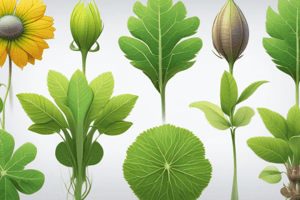Podcast
Questions and Answers
Where does the breakdown of glucose into ATP occur in plant cells?
Where does the breakdown of glucose into ATP occur in plant cells?
- Chloroplast
- Mitochondria (correct)
- Cytoplasm
- Vacuole
What is the process by which plants absorb water and release it into the atmosphere called?
What is the process by which plants absorb water and release it into the atmosphere called?
- Photosynthesis
- Respiration
- Transpiration (correct)
- Fermentation
How do plants absorb nutrients and water?
How do plants absorb nutrients and water?
- Through the roots (correct)
- Through the flowers
- Through the stomata
- Through the leaves
What are the chemical messengers that regulate various aspects of plant growth and development called?
What are the chemical messengers that regulate various aspects of plant growth and development called?
What offers insights into the processes and functions that occur within plants?
What offers insights into the processes and functions that occur within plants?
Flashcards
Photosynthesis
Photosynthesis
The process plants use to make food from sunlight, carbon dioxide, and water, releasing oxygen.
Respiration (in plants)
Respiration (in plants)
The process plants use to release energy from food, similar to how we breathe.
Transpiration
Transpiration
The process plants use to lose water vapor through their leaves.
Nutrient absorption
Nutrient absorption
Signup and view all the flashcards
Plant Growth and Development
Plant Growth and Development
Signup and view all the flashcards
Study Notes
Botany: The Study of Plants
Botany, also known as plant science, is the branch of biology that studies plants, their structure, function, development, and distribution. It includes the study of their evolutionary history, ecology, morphology, anatomy, physiology, biochemistry, and systematics. In this article, we will focus on the subtopic of plant physiology, which is the study of the functions and processes that occur within plants.
Plant Physiology
Plant physiology is the scientific study of the processes and functions that occur within plants, including their growth, development, and response to environmental stimuli. It involves the investigation of various biological processes, such as photosynthesis, respiration, transpiration, nutrient absorption, and water absorption.
Photosynthesis
Photosynthesis is a crucial process in plant physiology that involves the conversion of carbon dioxide (CO2) and water (H2O) into glucose (C6H12O6) and oxygen (O2). This process is facilitated by chlorophyll, a green pigment found in the chloroplasts of plant cells. Photosynthesis occurs in two main stages: the light-dependent reactions and the light-independent reactions (Calvin Cycle).
Respiration
Respiration is the process by which plants convert food molecules into energy. It occurs in the mitochondria of plant cells and involves the breakdown of glucose into ATP (adenosine triphosphate), which is used as energy by the plant.
Transpiration
Transpiration is the process by which plants absorb water and release it into the atmosphere. It occurs through the stomata, small pores found on the surface of plant leaves. Transpiration helps regulate the temperature of the plant and provides mechanical support.
Nutrient and Water Absorption
Plants absorb nutrients and water through their roots. The roots take in water and dissolved nutrients from the soil, which are then transported to the rest of the plant through the vascular system.
Plant Growth and Development
Plant growth and development are influenced by various factors, including genetics, the environment, and the availability of resources. Plant growth and development are regulated by hormones, which are chemical messengers that control various aspects of plant growth and development.
Conclusion
Plant physiology is a fascinating field of study that offers insights into the processes and functions that occur within plants. By understanding plant physiology, we can better appreciate the complexity and diversity of plant life and the important role they play in our ecosystems.
Studying That Suits You
Use AI to generate personalized quizzes and flashcards to suit your learning preferences.




